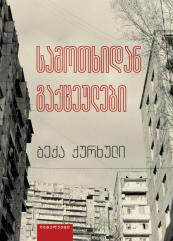RUNAWAYS FROM PARADISE
KURKHULI BEKA
Beka Kurkhuli’s Runaways from Paradise is an artistic retrospective look at our Georgia’s past. The Odyssey of three friends in a deeply moving story, with a sad, sometimes tragic content, takes place against the background of this epoch, which Georgian society has still not read through or thought through to the end. The main hero is not a specific person, but the epoch, and this book is an attempt at an artistic reading of the fate of the epoch. And the main hero is the language, too: the narrative language of these passionate, blood-stained and joyful stories, a language which perceives the epoch and the people in a natural and vivid way. This language is a protest: against all systems, against all sorts of violence and suppression.
This book is an epic, which keeps to all the rules of the epic genre: a long and tense adventure, countless characters, a play consisting of mathematically exact accounts of their stories, from the 1980s on, from the last days of the Soviet epoch to the most recent events, to be precise, history that has been seen and is then narrated, because the main thing in this novel is seeing, looking, these are observation points from which the author watches his times and existence and begins his narrative.
The expressiveness and dynamism of the narrative is well suited to his ‘warrior’ tempo and rhythm. This extreme atmosphere has an effect on the reader and quite naturally forces him to be aware that no war of any kind has ever finished and that it is impossible for a war to end in the most confused and ill-defined points, that it is impossible for one to consider it over, when you have lost so much. Against the background of the three friends and those close to, or known to them, we get a picture of Georgia, a country which has made mistakes, sometimes irreparable and fatal ones. The parents of these lads were peaceful children of the Soviet empire, some of them had ranks, or were permanently connected to the great empire by their fate and their lives: they were subordinate to and directed by that empire. Others, on the contrary, had forefathers who had been killed in the battle with the empire, and were silent rebels, but above all silent... And one day, the children of these parents became the most alien avengers; history reversed itself so sharply that it could leave nobody around indifferent: everyone was minced up by the mincing machine and new types were born to society, new people: old warriors became drug addicts, old secret policemen became archbishops, everyone found a place somewhere, some an important distinguished place, some shot off into non-existence…
‘About the book’s thickness I will say that the author himself is opposed to his pompous conception, he breaks it down throughout the novel, by the irony of the characters’ behaviour, by the grotesquery, sometimes by not caring, sometimes by being over-familiar. His heroes show that he himself is a sworn enemy of any falsity or exaggeration, because he has no need at all to exaggerate.
‘Both the story and the narrative are in themselves full of a great conception, an idea, of content.’
Nino Sadghobelashvili, writer, critic
Extract will be available soon
In case of using the information, please, indicate the source.
